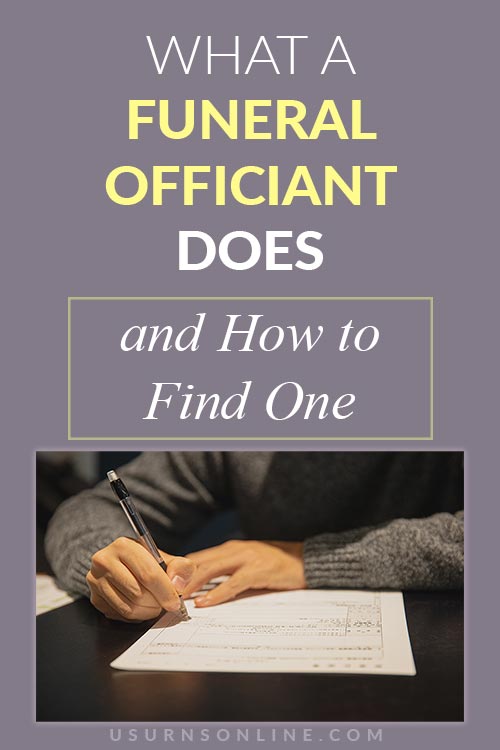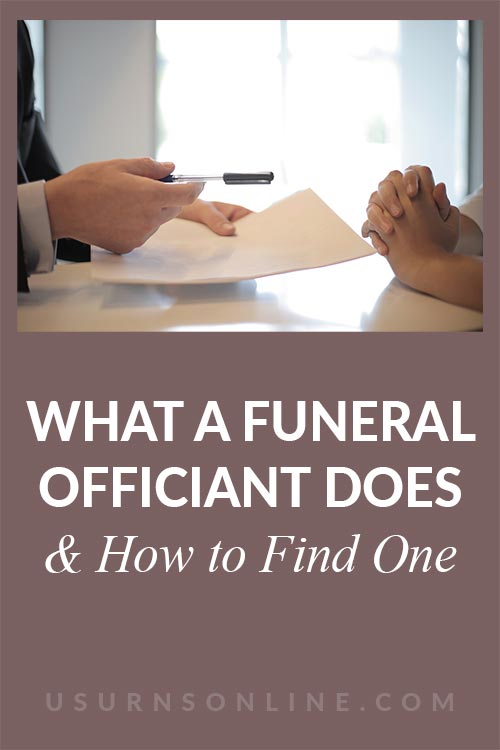Anyone can conduct a non-religious ceremony, including family or friends. But with that being said, your pun-loving uncle might not be the best choice.
So how do you choose someone to facilitate the funeral service? Do you have to pay an officiant, and if so, how much? How do you become a funeral officiant?
Below are some guidelines to follow on how to choose a funeral officiant.
What is a funeral officiant?
A funeral officiant is a professional who works with families to create a customized funeral or memorial service.
What does a funeral officiant do?
The funeral officiant is typically responsible for organizing the service, including determining the order of service. They will often deliver the eulogy, say prayers, sing hymns, and provide readings. The officiant can be as engaged as you’d like them to be.
It can be a good idea to invite your officiant to the initial meeting with the funeral director. This relationship helps the funeral director coordinate with the officiant to make everything run smoothly for you.
The funeral director and the officiant will keep in touch until the funeral is over. The two of them have much to plan together, and it makes it easier for all involved.
Who can officiate at a funeral?
A funeral officiant can be your religious leader, a minister, a funeral director, a professional celebrant, or a close friend or family member.
There are no set rules about the services or events. Legally, anyone is allowed to lead a funeral or memorial service. It’s up to you to choose who you would like to officiate at the funeral of your loved one.
Most commonly, the funeral officiant is a minister, the funeral director, or a professional celebrant.
Urns Made in the USA
What is the difference between a funeral officiant, funeral celebrant, funeral director, and a funeral conductor?
This can be a confusing question. They all sound similar, and have funeral in the title!
The funeral officiant is the role. This is the person who officiates or leads the service. Funeral directors and celebrants are occupations; these are professionals who can fulfill that role.
Let’s take a little closer look at each of these terms.
Funeral celebrant
A qualified funeral celebrant is a person usually from a non-clergy background who officiates funeral services. They will plan the Scriptures (if desired), the eulogy, readings, prayers, and hymns/songs.
Professional celebrants are typically certified by a training association or governing body, such at the NFDA (National Funeral Directors Association) or the Center for Celebrant Training.
People sometimes choose a professional celebrant in lieu of a religious minister. The celebrant will generally work with you to create the service of your choice, whether religious or not.
Much like a traditional religious minister, the celebrant will work closely with the family. If the celebrant doesn’t know the decedent, he wants to get acquainted with them through the family’s memories and stories.
Resources:
- A Guide to Funeral Readings
- The Best Funeral Songs of All Time
- 20 Best Eulogy Quotes
- 50 Comforting Sympathy Prayers
- 50 Best Funeral Scriptures
Funeral director
The funeral director is responsible for arranging every aspect of a funeral or memorial service. They accomplish this in a way that will do justice to both the decedent and their family and friends.
Funeral directors also take care of the paperwork involved with a person’s death. But, included in all of these duties, a funeral director can also officiate at the funeral or memorial service.
Funeral conductor
The function of the funeral conductor is to oversee the funeral or memorial service. The terms funeral conductor and funeral officiant are interchangeable when they are managing the funeral.
Funeral conductor is also a technical term used by some funeral homes. This term refers to the person who leads the team on the day of the funeral. He may or may not be the officiant, but will make sure that the whole program runs smoothly. He will also oversee the transport of the body to the crematorium or cemetery.
How to choose a good funeral officiant
As I stated earlier, anyone can officiate a funeral service. But there are certain qualities you will want to seek out for your officiant.
- Organizational skills. The officiant will be organizing the service, including determining the order of the service elements. Some of the events will include readings, hymns, and the eulogy. That’s just naming a few items to organize.
- Public speaking skills. They must be able to address a crowd. You want your officiant to be able to run the service with confidence. This should be someone who can articulate and hold the congregation’s attention.
- Calm and confident demeanor. Speaking in front of crowds can be very intimidating (and even more so when you are grieving) which is why families often choose a non-family member to officiate. You want an officiant to project a sense of confidence and calm.
- Observance of faith tradition. If you are having a religious ceremony, you will probably want a clergy member: a pastor, priest, or rabbi. It would be best to ask the leader of the church or synagogue to perform this honor.
With the service held at the funeral home, the funeral director can lead the service. Or you can bring in a clergy member, a friend, or a family member to officiate.
If you have a memorial service at a venue of your choosing, you can ask anyone you like to officiate.
How do you find a non-religious funeral officiant?
To locate an officiant in your area, you can do a typical web search, ask your funeral director for suggestions, or visit a site like the Celebrant Institute.
The non-religious officiant will focus on personalizing each ceremony. The service should reflect the needs, beliefs, and values of the family,
A non-religious officiant might also go by the title humanist officiant. This is a celebrant accredited and trained in non-religious ceremonies.
A non-religious or humanist ceremony is a celebration of your loved one’s life with an honorable farewell. The ceremony pays tribute to your loved one without religious overtones. It still recognizes the grief of death but also celebrates the life of your loved one.
Non-religious funeral services don’t adhere to any particular religious traditions. The funeral program will often follow the same general structure:
- An opening or welcoming statement
- Stories from friends and family
- A eulogy from a respected community member
- Followed by a moment of silence
- Music – sometimes
- Dismissal
How much do funeral officiants charge?
Charges can range from $250 to $1,000, depending on the services provided. Some celebrants charge a flat rate. In contrast, others charge by the hour.
Some officiants may only ask for a donation. In that case, it’s up to you to decide. I would recommend $200 at a minimum for your donation.
How do you become a funeral officiant?
You do not need formal qualifications to become an officiant. If you are considering doing this professionally, training will certainly help your career prospects.
However, if you would like to become a certified funeral officiant, you must take training. To become a certified funeral celebrant, look for state certification programs. Typically they require you to take an online course and register for at least 10 hours of training.
One of the most recognized celebrant programs is given through the International Cemetery, Cremation and Funeral Association (ICCFA).
Do you have to be ordained to officiate a funeral?
No, you do not have to be ordained to officiate at a funeral service. There is no governing body, so there are no legal requirements. But since this is such an important role within the funeral, you may want someone with some experience.
Today, many traditions have gone by the wayside. We don’t always follow the same standards as past generations. Because of these changes, we have the freedom to plan our own funerals.
This can present some challenges, as there is a real sense of “starting from scratch.” This is where the new role of a funeral celebrant works so beautifully.
Read Next: The Funeral Process, Explained by a Funeral Director
Pin It






It may sound rude but I would like to check reviews on non clergy officiants but don’t know where to look.
The best places to look for reviews would be on Google business profiles (often found on Maps or just a web search for the officiant’s name) or on social media, such as Facebook. Funeral Officiant is a fairly niche (and recent) occupation, and most would do it part-time so you may not easily find reviews.
The best review of all, of course, is word of mouth, so ask around. If family and friends don’t have any recommendations, call up some funeral homes and see if they know of any funeral officiants that they would recommend.